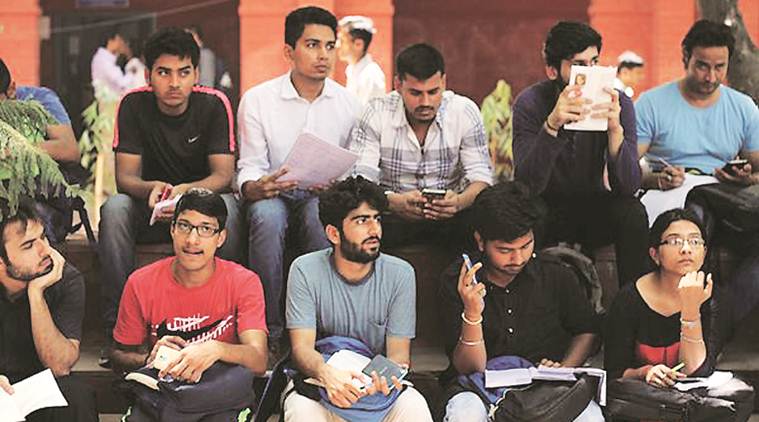
The Indian Express
Why are students across India opposing online exams?
Incomplete syllabus, stress over the ongoing pandemic, and fear of not getting degrees on time are key concerns of students demanding promotion on the basis of internal assessments. Most are also facing problems due to a lack of infrastructure to appear for the online exams.
by Shyna KalraStudents across universities and colleges in India have been unitedly protesting against the decision to hold online exams. While infrastructure is the key issue, many also claim that their regular classes came to a stop before the syllabus could be completed. Most universities have rushed through the course work via online classes, claim students. None of the institutes have received 100 per cent attendance during these online sessions.
Many universities are also providing an option for students to appear in the offline mode of examination if they are unable to opt for online mode. However, it’s not clear when these exams will be held, and when the results and corresponding degrees will be released. Aayan (name changed on request), a student from Delhi Technical University (DTU), said, “I have already been placed and my deferred joining will be around August-September, which is when the university wishes to hold the offline exam. I need to produce a pass certificate for my degree course at the time of joining. It is impossible to have continuous two-hour internet connectivity and power supply in my native village in UP. I do not own a laptop. If I do not clear the exam, this will impact my job as well.”
Read| How are exams from home conducted, all you need to know about AI proctoring
He, however, is not alone. Students who have been shifted from hostels, especially those in low connectivity areas and economically weaker sections of the society have been calling these exams ‘unfair’. The prerequisites of online exams include a laptop or computer with a functioning webcam and uninterrupted power supply. Where proctoring is used, students also need to ensure they have an entire room to themselves for the entire duration of the exam.
This has not gone down well with teachers either. The Delhi University Teachers Association has, in several statements, termed such exams systems a “mockery”, “biased”, and agents of “increasing digital divides”. They have also claimed that these exams, including the Delhi University’s open-book exam, are not in line with the type of course structure.
Students were forced to evacuate hostels in March, before the nationwide lockdown was announced. A student from NIT-Surat told indianexpress.com, “Of the 900 students of our final year batch, around 700 are hostellers. When we left our hostels, we were in a rush. We packed clothes and essentials mostly. Our laptops, books and notes are all in the hostel rooms. The final term exams consist of the syllabus from the entire year for which we do not have the study material. Institute is also not providing us any e-resources, how will we prepare?”
He added, “Generally, we have around two months to complete our syllabus but now, it was conducted through 14-15 online lectures, most of which we accessed through phones from our remote locations. Students who stayed back in hostels or are day-boarders will have an advantage over us in terms of availability of internet as well books; conducting exams in such a situation will be unjust and biased.”
Syllabus incomplete, nevertheless exams dates are out
In other institutes like Savitribai Phule Pune University (SPPU) and Asian College of Journalism (ACJ), students claim the syllabus is not complete but the university is going ahead with the exams. While SPPU has announced to conduct exams in the offline mode, students are still not happy. One student told indianexpress.com, “Our senate recently passed a circular saying only 60 per cent of the syllabus will be asked in exams. This means, hardly one or two units more than the mid-term exams, for which the results are yet to be announced. Amid rising cases of coronavirus, it is not wise to hold exams again for the same topics. For the rest of the syllabus, classes started via Zoom towards the end of March but not everyone was able to access the sessions.”
Several institutes have taken back their stance on conducting online exams. While IIM-Ropar postponed the online entrance test for the five-year Integrated Programme in Management (IPM) course, Pondicherry University has also pulled back its notice on conducting online exams after an uproar from students.
Online petition website change.org has at least dozens of petitions against online exams. Congress-backed student body NSUI demands to promote students without online exams. “With delayed academic calendar and the possibility of online examination without course-work being complete, there is a great deal of trepidation among the students,” the student body said in a petition. It is asking to promote final-year students based on past performance with an extra 10 per cent marks as it claims that students on average improve their performance in the final year. Its petition has received over 1 lakh signatures as on May 25.
Another petition by Mount Carmel College, Karnataka claims, “One examination doesn’t determine the quality of a student’s academic performance” and hence demands a “humanitarian and egalitarian approach” towards assessment.
Most of the online petitions are from Maharashtra, which has the most number of coronavirus cases in India. Students demand to be promoted based on internal assessment. The state education minister had also written to the HRD ministry raising students’ concerns. However, no final decision has been taken yet.